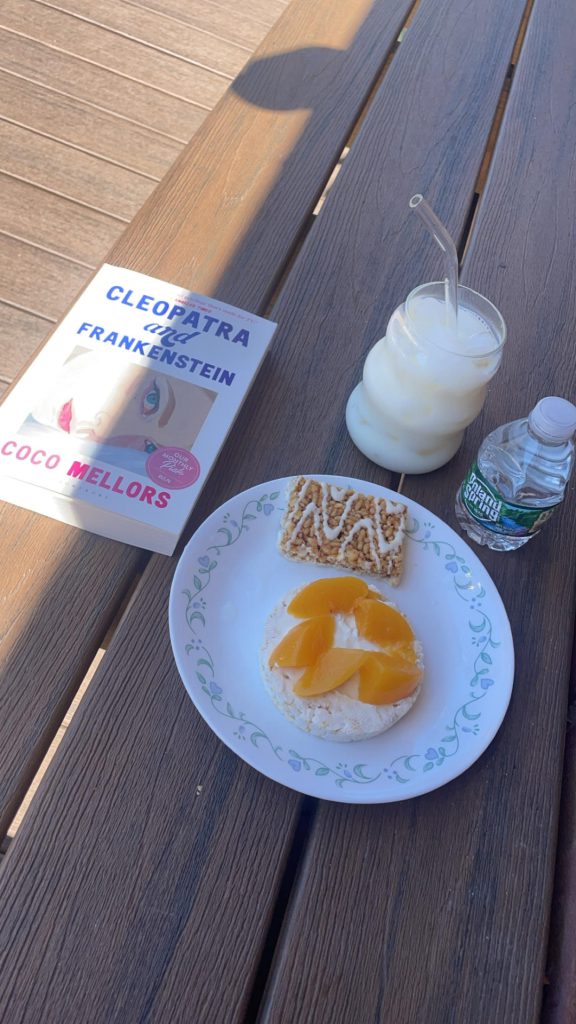Cleopatra and Frankenstein, Coco Mellors, 2022
Apologies if anybody takes issue with this comparison but the themes in Mellors’ Cleopatra and Frankenstein—hard truths about love being temporal and complicated—gave me the same wake-up shock as did James Baldwin’s Giovanni’s Room. The writing, I’d even say, had the same caliber of thoughtfulness and art. In Mellors’ acknowledgements in the back, she says it took 7 years to write this novel, and boy do I believe it!
I’m finding I’m a sucker for a third person omniscient narrator. We get to know Mellors’ characters so well through the novel’s omniscient narration, which is necessary for building the incredibly complicated dynamics and for creating the idea that there’s always a gray area; no one is all good or all bad. Everyone’s got their side of a story.
Summary isn’t the simplest task for a novel like this, but I’ll attempt quickly before getting into the thick of it: Cleo (24) and Frank (45?) meet in an elevator leaving a NYE party, quickly fall in love and decide to get married (partially because Cleo is English and needs a visa to stay in New York), and then they quickly find they aren’t well suited for one another because Frank is a workaholic who drinks a lot and Cleo is a depressed artist. Though these are our main characters, the chapters also survey the lives of the people in their lives such as Frank’s sister Zoe, his best friend Anders, his other long time friend Santiago, Cleo’s best friend Quentin, and Frank’s coworker Eleanor.
This novel is heavy on dialogue—a strength of the novel. In a novel so character heavy, it’s essential we hear their voices well in order to know who exactly they are. And we do. It is actually mind blowing that one human being—Coco Mellors—is able to emulate so many different personalities; so many different ways of thinking and seeing the world. I almost don’t believe she wrote this alone (I’m joking—I do. I believe in genius). Anyway, the dialogue is witty and clever and funny at times, but also incredibly dark and deep and terse when necessary, and it allows the pacing of the novel to lull and sail whenever necessary.
Coco Mellors writes in a calm and serene manner. In the two weeks (and many different settings) it took me to read the novel (may sound like a long time but I’m currently a Master’s student so reading for fun has been a bit on the backburner), I most looked forward to reading during sunny, quiet mornings, which I felt matched the novel’s energy well.
Every sentence is sensual and deliberate. All of it. Cleo’s depression—which isn’t overly explained, yet it is very understood—feels at points as though it was bouncing off the page and into myself. So heavy with sadness and loneliness.
Yes. That’s what this book is. This book is loneliness. Passionate love, exciting and lonely.
I think all would agree that picking a favorite character in a book like Cleopatra and Frankenstein is somehow both incredibly difficult and also a no brainer. Since all characters are written with such intricate stories of their own, it’s easy to feel more connected to one than the others; however, since we know all their thoughts and motivations, it’s also hard to hate any of them. None of them are bad, and all of them have been hurt.
If I had to choose a favorite, I think I would say Anders. This may be incredibly controversial, because he’s the novel’s biggest player, and he cheats with Cleo on Frank, his very best friend. But I feel for the man. What an awful place to be—in love with your best friend’s wife, especially if she’s unhappy in her marriage and in love with you back. I respected the way Anders dealt with the situation after Frank returned from the trip he was on which allowed for the cheating. This is also controversial, because he essentially ghosted Cleo which led to her almost successful suicide attempt. But what else could he do in this situation? Cleo wasn’t going to leave Frank, so he had to remove himself from the picture.
I was also a fan of Santiago, who’s story differs from the rest of the characters because it’s a little further removed from Cleo and Frank; his struggles surround binge eating and body image.
My honorable mention is Jiro. He’s such a minor character, but he lends the most optimistic lesson to the novel. Frank’s sister Zoe is hired as an escort for him for 500 dollars, and, where we expect he’ll expect sexual favors and be at least slightly degrading towards her, he ends up being the most genuine character in the book. He’s only interested in having Zoe as a companion, and in sharing his Buddhist wisdom her way. Their platonic relationship is sweet, really. Not all men are bad.
Frank is probably the character I dislike most (and Quentin annoys me too). Now, I will admit, Frank handles Cleo well. He is a good husband to her, despite his growing feelings for Eleanor, and Cleo’s own irrevocable sadness which may be misleadingly attributed to him. However, he seems to me to be less aware than the rest of the characters. He’s an extrovert, where most of them are introverts—maybe that’s the issue. And he’s very easily influenced. Toward the end, during the divorce, he knows he and Cleo’s split is for the best, yet when he visits her it’s as if he would leave Eleanor in a heartbeat if Cleo said the right word.
And Eleanor—her stream of consciousness fell in only 2 chapters, both very, very long. Formatted differently than the rest. I don’t blame her for falling for Frank, but I will say, Frank seems like the kind who just loves a shiny toy. Anders, on one hand, will sleep with whoever will let him, but Frank, on the other, will fall for whoever’s witty and pretty. Fall for.
The book personifies well the idea of “out of sight, out of mind,” at least where Frank is concerned. And that, I’d say, is one of the hardest pills to swallow, especially when considering the love he and Cleo share—and then he and Eleanor—which we’re made to believe is worthwhile (since he does too) until he sees the other.
So yes, this novel displays such a complicated range of emotions, and the most toxic as well as addicting parts of love (which Mellors makes a point to show go hand in hand). If I were to make a gander, I’d say Coco Mellors and I have had similar experiences with love, because this novel broke my heart.
4.5/5.
Quotes:
Cleo watches Frank’s profile in the light. Boom, boom, boom. He was staring up ahead, jaw set, eyes wet and reflective.
Then he tried his drug dealer, who picked up on the second ring. He ordered his usual and perched on the windowsill to light another cigarette. The sky outside was turning a dark, bruised blue.
He became the hook upon which she hung her whole self.
They had found this incredible thing together. Why didn’t he want to do it again and again and again?
I roll down the window and laugh until I cry.
This, I imagine, is what it feels like to be digested.
Frank squeezed her hand in the darkness. “I like how you see me.” Frank turned onto his back, and Cleo moved to put her head on his chest. He stroked her hair at her temples with one hand. “I think I see you as you are.” She said.
“What?” she asked. “Too many feelings for you, Frank?” He looked up at her from between his hands. “It’s not fun, you know,” he said quietly, “always being wrong.”
“She was an artist, like you. With a—I don’t know how to say this well—an ego that is large but self-esteem that is small?”
Alcohol had soothed him, numbed him, loved him, when no one else could.
They were at an impasse. Frank dropped himself to the sofa and stared up at the ceiling. “Do you have any idea how it’s felt to be married to you?” he said quietly, “I could feel your disappointment in me from ten blocks away.” “No, you could feel your disappointment in you. Proximity to me just made you aware of it.” “See, you state that like it’s a fact, like you have some higher knowledge of my psyche that I’m not privy to, but it’s just your interpretation.”
In that moment, he learned that he had the capacity to hate her.
She stayed silent, and they both sat in the absence of her confession, each understanding the other, each entirely alone in that understanding.
It was her scar, protruding from her sleeve like an exclamation point.






